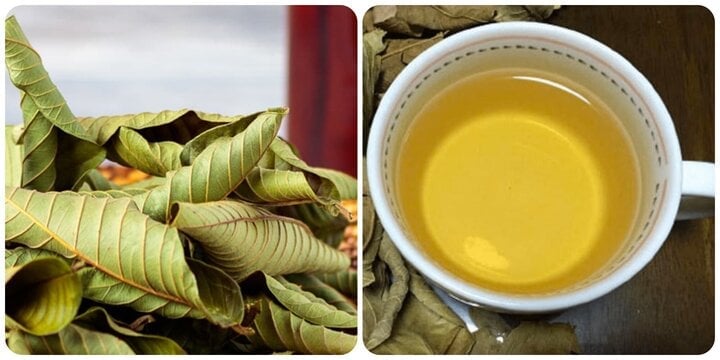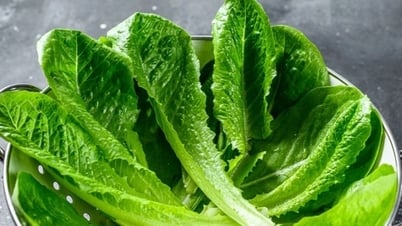Guava is a familiar fruit to Vietnamese people, considered one of the super fruits with many benefits, but not everyone knows the effects of guava leaves. Young guava leaves are herbs used in Oriental medicine as well as in Mexico and some regions of South America.
The most popular way to use guava leaves is to make guava leaf tea. With dried guava leaves, steep 2.5-5g of leaves in 250ml of boiling water for about 10 minutes. With fresh guava leaves, you need to wash 5-10 leaves, then drop them into 500ml of boiling water, cover tightly and steep over low heat for 10 minutes. In addition, guava leaves are also used in dishes such as steamed snails, braised fish, spring rolls, etc. Below are the scientifically proven effects of guava leaf tea:
Lower blood fat, good for the heart
Healthline cited a study in the journal Nutrition and Metabolism that found that participants who drank guava leaf tea had lower cholesterol levels after eight weeks. A 2011 study published in the journal Chemistry and Physics also found that compounds in guava leaves help dissolve “bad” cholesterol.
Various studies have concluded that people who consume guava leaf tea regularly for 3 months will see positive results with blood lipids, stabilize blood pressure, reduce the risk of heart disease and maintain cardiovascular health.

Guava leaves are very good for health.
Guava leaves help cure diarrhea
The article on the Medlatec General Hospital website has medical consultation from BSCKI. Duong Ngoc Van said that one of the commonly used effects of guava leaves is to treat diarrhea.
The main reason is that guava leaves and young guava buds contain tannins and some extracts that inhibit the activity of staphylococcus aureus and E.coli bacteria. Thereby, helping to reduce the symptoms of diarrhea. In addition, the use of young guava leaves also helps to tighten the intestinal mucosa better.
Stabilize blood sugar
What are the health benefits of guava leaves? You may not know that using guava leaves is effective in controlling blood sugar levels and insulin resistance. Therefore, using guava leaves is very good for people with diabetes.
Guava leaves have this effect due to the group of substances such as Avicularin and Quercetin that have the ability to inhibit glucose absorption.
Prevent cancer risk
With the presence of antioxidants, using guava leaves has the effect of reducing the formation of free radicals - the cause of the formation of cancer cells. In particular, the lycopene component is highly effective in preventing and treating breast cancer and prostate cancer.
Losing weight
Another effect of guava leaves that women love is supporting weight loss. Studies show that guava leaves help reduce starch intake and sugar metabolism in the body. Therefore, women can use guava leaf tea, guava leaf juice or guava leaf juice blended with fruit juice to improve their figure.
Improve oral health
If you are still wondering what the health benefits of guava leaves are, here is the next answer that you may not know. That is improving the health of gums and teeth.
The main reason is that guava leaves contain astringents that help tighten the tooth roots and relieve pain in the gums. The method of use is also very simple, you just need to use fresh guava leaves that have been washed and crushed. After a short time, toothache and gum pain will tend to decrease. The condition of inflammation and gum infection will also be significantly improved if this method is used regularly.
Improve sleep quality
Drinking guava leaf tea regularly helps improve sleep quality. Guava leaves calm your nerves and soothe your mind, helping you fall asleep more easily.
Notes when using guava leaves
Guava leaves are good for health but you should only drink 1-2 cups of tea/day after meals, drinking cold or hot is effective but you should not drink too much to avoid digestive problems. People who are taking medication should consult a doctor before adding this tea to their daily diet.
Above are the wonderful effects of guava leaves on health. Use guava leaves properly for good health.
Source






![[Photo] Prime Ministers of Vietnam and Thailand visit the Exhibition of traditional handicraft products](https://vphoto.vietnam.vn/thumb/1200x675/vietnam/resource/IMAGE/2025/5/15/6cfcd1c23b3e4a238b7fcf93c91a65dd)



























![[Photo] National Assembly Chairman Tran Thanh Man meets with Thai Prime Minister Paetongtarn Shinawatra](https://vphoto.vietnam.vn/thumb/1200x675/vietnam/resource/IMAGE/2025/5/15/e71160b1572a457395f2816d84a18b45)































































Comment (0)